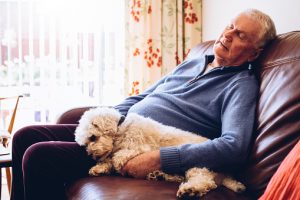 If you’re struggling to lose weight even though you’re doing all of the typical weight loss things, then you may be sleeping poorly. Poor sleep is the hidden culprit holding you back from your ideal weight. Research suggests that getting adequate sleep is key to fighting the weight gain battle.
If you’re struggling to lose weight even though you’re doing all of the typical weight loss things, then you may be sleeping poorly. Poor sleep is the hidden culprit holding you back from your ideal weight. Research suggests that getting adequate sleep is key to fighting the weight gain battle.
Studies have shown that sleep deprivation increases the hormones responsible for appetite and hunger, meaning you will eat more and feel hungrier the day after a poor night’s sleep as opposed to when you sleep well. Furthermore, those who experience poor sleep are more likely to opt for comfort foods that are often less healthy.
Advertisement
Recommended sleep is between seven to eight hours for adults, yet there is a sleep epidemic in America. Many adults are not getting anywhere close to the recommended amount of sleep. Seniors are a large demographic who fall into the poor sleep category as it becomes increasingly more difficult to sleep as you age, either as a result of aches and pains or another underlying medical condition.
Tips to getting a good night’s sleep
Not only can sleep help you achieve your ideal weight, but it’s an integral part of overall good health. If you aren’t getting proper sleep night after night, then you may want to follow these tips in order to get a good night’s sleep.
- Exercise regularly, but avoid exercising too close to when you are about to sleep.
- Create a bedtime routine that promotes relaxation and tranquility. This includes listening to music, meditating, or reading a book.
- If you want to opt for a pre-bedtime beverage, stick to a herbal tea and avoid alcohol. Although you feel tired after drinking alcohol, it actually disrupts your sleep, causing you to feel even more tired the following day.
- Ensure your bedroom promotes a good night’s sleep. This means it is dark, cool, your bed is comfortable, you have properly supporting pillows, and there is no technology around you to pose a distraction.
- Avoid using technology prior to going to bed because the blue light that these devices emit can disrupt the release of melatonin, which is a necessary sleep hormone. Delayed melatonin can lead you to have a poor sleep.
If you have tried these remedies to get a good night’s sleep but are still finding it difficult, then you may want to speak to your doctor. There could be a medical reason as to why you cannot sleep. Furthermore, some medications you are taking may be the cause of your poor sleep, so talking to your doctor can help you find a solution.
Related: Simple fixes for your sleep troubles
